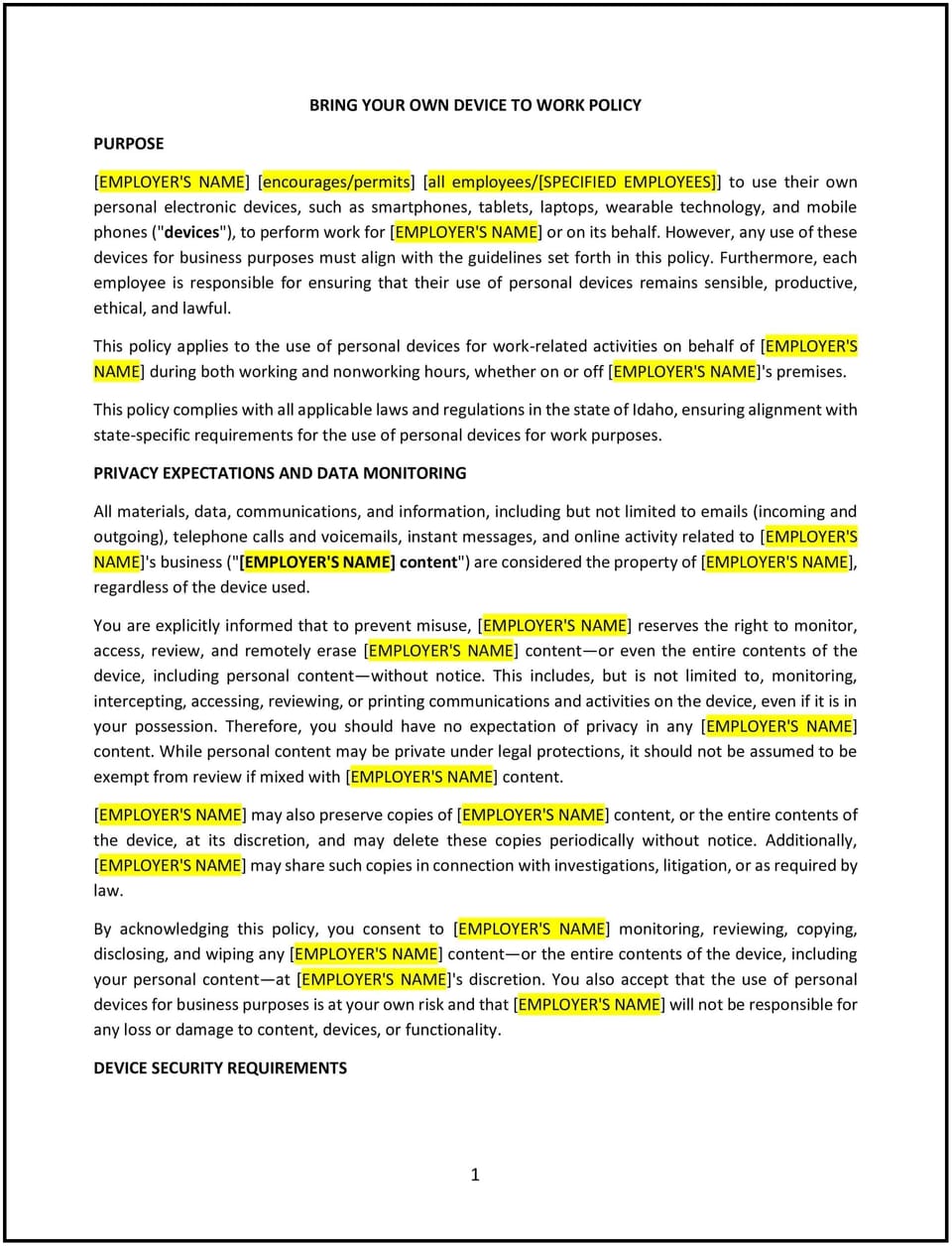Bring your own device to work policy (Idaho): Free template

Bring your own device to work policy (Idaho)
A bring your own device (BYOD) policy helps Idaho businesses establish guidelines for employees who use personal devices, such as smartphones, tablets, or laptops, for work-related tasks. This policy outlines the acceptable use of personal devices, security requirements, and the business’s rights to access or manage data on these devices. It also provides clarity on reimbursement, privacy, and liability issues.
By implementing this policy, businesses can enhance flexibility, improve productivity, and reduce costs while maintaining data security and operational efficiency.
How to use this bring your own device to work policy (Idaho)
- Define acceptable use: Specify which devices are allowed, the types of work-related tasks they can be used for, and any restrictions on personal use during work hours.
- Establish security requirements: Outline the security measures employees must follow, such as using strong passwords, enabling encryption, and installing approved security software.
- Address data access and management: Clarify the business’s rights to access, monitor, or wipe data on personal devices used for work, ensuring employees understand the terms.
- Provide reimbursement guidelines: State whether the business will reimburse employees for data usage, device maintenance, or other expenses related to using personal devices for work.
- Protect employee privacy: Specify how the business will handle personal data on employee-owned devices and ensure privacy is respected when accessing work-related information.
- Define liability: Outline the responsibilities of both the business and the employee in case of device loss, theft, or damage, as well as any limitations on the business’s liability.
- Communicate the policy: Share the policy with employees during onboarding, training sessions, and through internal communications to ensure awareness and understanding.
- Review and update: Regularly review the policy to ensure it remains aligned with technological advancements, business needs, and Idaho laws.
Benefits of using this bring your own device to work policy (Idaho)
This policy provides numerous benefits for Idaho businesses:
- Enhances flexibility: Allowing employees to use personal devices can improve work-life balance and enable remote work options.
- Increases productivity: Employees may feel more comfortable and efficient using familiar devices, leading to higher productivity.
- Reduces costs: Businesses can save on hardware expenses by allowing employees to use their own devices for work.
- Improves employee satisfaction: A BYOD policy can increase employee satisfaction by offering convenience and flexibility.
- Maintains data security: Clear security requirements help protect sensitive business information and reduce the risk of data breaches.
- Provides clarity: A well-defined policy ensures consistent treatment of all employees and reduces potential misunderstandings.
- Supports modern work practices: A BYOD policy reflects contemporary workplace trends and can enhance the business’s reputation among employees and job seekers.
Tips for using this bring your own device to work policy (Idaho)
- Communicate the policy effectively: Share the policy with employees during onboarding, training sessions, and through internal communications to ensure awareness.
- Train employees: Provide training on the policy, security requirements, and best practices for using personal devices for work.
- Implement security measures: Ensure employees follow security protocols, such as using strong passwords, enabling encryption, and installing approved security software.
- Monitor compliance: Regularly review employee adherence to the policy and address any issues promptly.
- Offer support: Provide technical support for employees using personal devices for work, such as troubleshooting assistance or access to IT resources.
- Review the policy regularly: Update the policy as needed to reflect changes in technology, business needs, or Idaho laws.
- Lead by example: Encourage leadership to follow the policy and model best practices for using personal devices for work.
Q: Why should Idaho businesses have a BYOD policy?
A: A BYOD policy helps businesses enhance flexibility, improve productivity, and reduce costs while maintaining data security and operational efficiency.
Q: What devices are allowed under this policy?
A: The policy should specify which personal devices, such as smartphones, tablets, or laptops, are allowed for work-related tasks.
Q: What security measures should businesses require for personal devices?
A: Businesses should require employees to use strong passwords, enable encryption, and install approved security software on personal devices used for work.
Q: Can businesses access or manage data on personal devices?
A: Businesses should clarify their rights to access, monitor, or wipe data on personal devices used for work, ensuring employees understand the terms.
Q: Should businesses reimburse employees for using personal devices?
A: Businesses should decide whether to reimburse employees for data usage, device maintenance, or other expenses related to using personal devices for work.
Q: How should businesses handle employee privacy with BYOD?
A: Businesses should specify how they will handle personal data on employee-owned devices and ensure privacy is respected when accessing work-related information.
Q: What happens if a personal device is lost, stolen, or damaged?
A: The policy should outline the responsibilities of both the business and the employee in such cases, as well as any limitations on the business’s liability.
Q: How often should the policy be reviewed?
A: The policy should be reviewed annually or as needed to reflect changes in technology, business needs, or Idaho laws.
This article contains general legal information and does not contain legal advice. Cobrief is not a law firm or a substitute for an attorney or law firm. The law is complex and changes often. For legal advice, please ask a lawyer.


